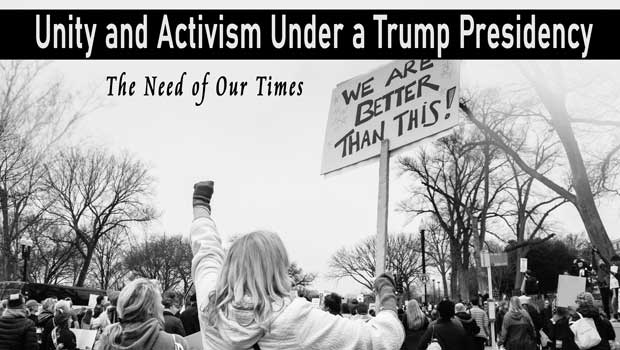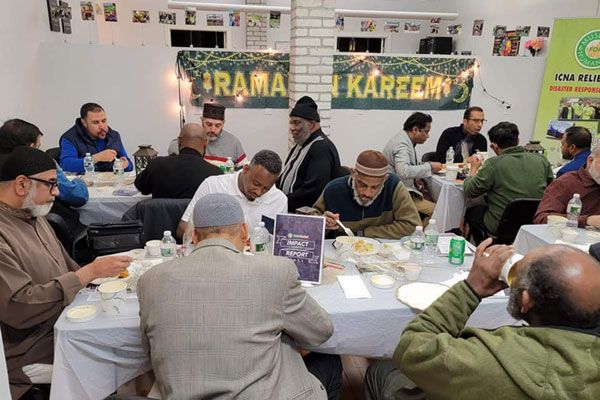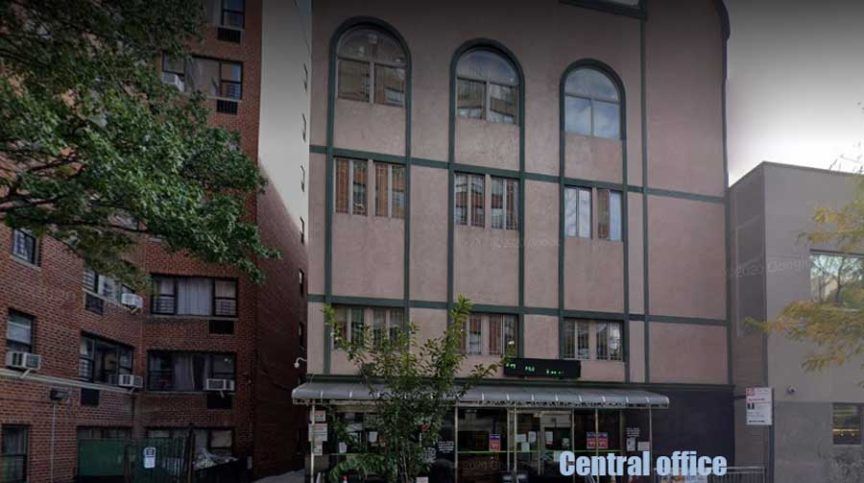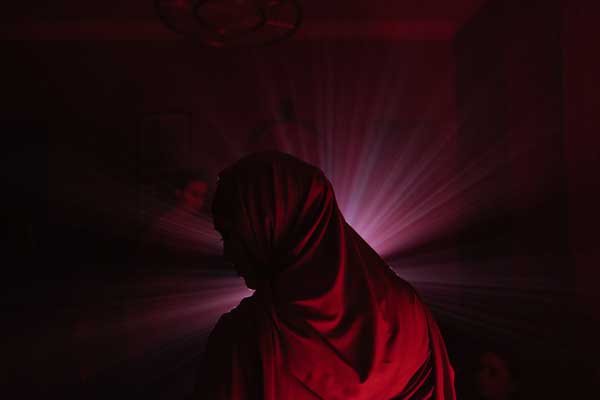On a rainy January 20, 2017 Donald J. Trump became the president of the United States after winning the Electoral College and losing the popular vote by over three million. The pomp and ceremony, military and police presence, even the somberness of the day lacked the celebration of at least the previous two inaugurations. The twitter-verse remarked that the “sky was crying” and dissent filled the air blocks away amid a wide range of socially disparate individuals from Muslims, immigrants, blacks, Latinos, and gays, to whites who blocked roads and held bold signs demanding impeachment and likening Trump to Hitler. With a nation politically divided along many fissures that have been growing over the past several decades, Muslims also found themselves separated along similar lines. Muslim Republicans, Democrats, and Independents voted their conscience and helped usher in one of the most divisive administrations America has ever seen. Economic concerns and social issues like illegal immigration, abortion, and gay marriage were uppermost in the minds of conservative Muslim voters. Most Muslim voters were concerned about eroding civil liberties, continued wars, and America’s foreign policies.
Unity is a necessary goal, but not easy to achieve. Muslim-led organizations need to work with other groups on a grassroots level. There is certainly strength in numbers and the many diverse organizations working toward the same over-arching goals can achieve much more than singular, non-allied groups.
The inauguration was a historic moment in many ways, the least of which was the visibly low turnout of spectators which Trump, in narcissistic fashion, continued to rail against in his early morning twitter rants. Nothing could stop the juggernaut ascension of Trump to the highest office in the land. The fervent wishes and voting choice of the majority of Americans got swallowed up by the Electoral College system, and the prayers of believers did not change the course that America has been set upon, for good or ill. What then is left in the repertoire of activists as they prepare for the coming years of a presidency run by an ill-equipped, self-obsessed, money-hungry, politically clumsy elitist, along with his chief strategist, Steve Bannon, a white nationalist, White House Chief of Staff Reince Preibus and Vice President Mike Pence, both right-wing powerhouses. Rule by oligarchs, corporate corruption, criminal war-making, oppression and occupation, and layers of disinformation — these all exist in the world today, but it can get so much worse. However dire the future looks, fear and hopelessness must be displaced by courage and conviction in hearts and minds of those aligned against this new world order.
The Role Muslims Can Play
For Muslims, particularly, it is a matter of faith. We should fear only Allah since we know that all things happen according to His will and plan. So we make our choices day to day, and determine to the best of our ability the course we are going to follow. We then leave the rest up to Allah (SWT). What remains then is how Muslims participate in this new political reality. Representation in government at the local, state, and federal levels, of Muslims and their concerns, is still limited but slowly increasing. In the fledgling Somali voting block of Minneapolis, Minnesota they elected the first Somali woman to state office. As more Muslim American state representatives continue to be elected, some of them will find themselves in national positions within the next ten years. The primary concern now is how to represent Islam in its totality, from its politics to its social ideals, and to advocate for Muslims. Imam Omar Suleiman, President of the Yaqeen Institute for Islamic Research, summed up in a speech at the ICNA/MAS convention in December, 2016 what the Muslim activist position should be: “If we allow fear to drive us to continue to do away with notions of our faith that others find problematic because of their ignorance and because of their racism and their bigotry, rather than standing boldly and explaining and defining those concepts and showing them in motion and in action and how they contribute to the betterment of society then we will slowly see our identity disappear.” He went on to say that Islam “should be in motion” as an active religion that betters all societies. Sometimes that means dissent within the confines of a unified front.
Never has there been a more urgent time to stand tall and firm in speaking about Islam and countering all misrepresentations of the faith. Steve Bannon is an avowed Islamophobe with a belief in a coming apocalyptic battle between the Judeo-Christian world and Islam. And Jared Kushner, Trump’s son-in-law, is now senior advisor to the president. He is also purportedly being considered for the role of peace broker between Israel and the Palestinians, while his family has donated tens of thousands of dollars to illegal West Bank settlements, according to their tax forms. A negative perception of Islam is at the heart of this administration’s immigration and foreign policy agendas. It matters little to these ideologues in power how high American flags fly at Islamic centers, how often Muslims leaders and organizations condemn terror, or how often public officials are welcomed to address Muslim community and masjid events.
‘Get Up, Stand Up, Don’t Give Up the Fight’
It is understandable that many Americans are worried, but we must maintain a long view and broad perspective. Allah (SWT) tells us in the Quran, “And obey Allah and His Messenger, and do not dispute and [thus] lose courage and [then] your strength would depart; and be patient. Indeed, Allah is with the patient” (Quran 8:46). Already there is some light shining in the politically divisive gloom — an unintended consequence of the new future with Trump is that a robust and growing opposition has risen against him and his absolutist, autocratic inner circle. Uniting to push back against hate, against division, is a myriad of groups who are protesting, filing legal actions, and vowing to keep America the land of diversity and tolerance.
Trump has become the symbol of both ultra-right zealotry and crass, profit-driven opportunism. Organizations and individuals working towards social and racial justice, immigration and migrant rights, national universal health care, women’s reproductive rights, and environmental protections have naturally and spontaneously united against the threat to our civil liberties and even our survival. The “Stop Trump” mantra speaks of a fragile unity, organic, without structure. It is reactive rather than a deeply entrenched, planned revolt. Yet, it took hold. The tiny spark of unified dissent was launched the day after the inauguration as the Women’s March took place across major cities in America and in several countries abroad as well, collectively numbering in the millions. An estimated 650,000 to over one million women and men took to the streets of Washington D.C. The signs held aloft on that day spoke eloquently of the fervor protestors felt: Get up, stand up, don’t give up the fight; We are better than this; Another world is possible; Babies against bigots; No white supremacists in the White House; Senate, have a spine, block Trump’s cabinet of horrors; Billionaires in the swamp; Muslim rights are human rights; Jews & Muslims stronger together; Refugees welcome; United we stand, divided we fall; No human being is illegal; Hate is un-American; Hatred’s greatest weapon is complacency.
The march in Washington was co-organized by a young Palestinian-American Muslim woman, Linda Sarsour. You may be a social conservative and have an issue with Sarsour aligning herself with Planned Parenthood and various LGBTQ groups for the march, but we cannot deny the political impact that such an historic event had and will continue to have. Protests are the matchstick that sets a movement on fire. “It’s more than just a release for anger – taking to the streets is a necessary way to participate in democracy” notes Sarah Jaffe, a writer for Rolling Stone magazine. But without direction, a movement can fizzle out and disappear from the front pages or evening news as new distractions emerge, or it can organize and grow so as to significantly impact the political reality. So what comes after the euphoria of speeches, the camaraderie of protest, the zeal and fervor for change?
For now, the motivation to continue standing up and being counted is strong, as Trump has been busy signing controversial executive orders and pushing through divisive cabinet appointments. In his first week he signed orders to gut major provisions of the Affordable Care Act, expedite infrastructure projects through environmental and business-related deregulations, build a 1,900-mile long wall, deport undocumented immigrants, and impose a travel ban against seven Muslim-majority countries. He also green-lighted the Keystone and Dakota Access Pipelines, the latter being close to Standing Rock Sioux tribal lands in North Dakota, threatening their sources of water.
Jeremi Suri, in The Atlantic, warns, “With his barrage of executive orders, Trump is taking America back to the historical nightmares of the world before December 1941: closed borders, limited trade, intolerance to diversity, arms races, and a go-it-alone national race to the bottom. His executive order on ‘rebuilding the U.S. armed forces’ calls for ‘peace through strength,’ but this document and the others he signed offer nothing but unilateralism and militarization: more military spending, more nuclear weapons, more use of torture (which is illegal), and more promises to destroy ISIS and other terrorist threats. The executive orders promise to curtail American participation in international organizations, prohibit whole categories of foreigners from entering our country, and limit exchanges of ideas and goods.” David Leonhardt, writing in the New York Times, points out that countering Trump initiatives will demand a sustained effort. “If progressives want to have an effect — if they want to defend civil rights, protect the environment and keep millions of people from losing health insurance, among other things — the hard work hasn’t even begun.”
Protests as Well as Political Participation
People spontaneously took to the streets and airports to protest the most immediately executed of the executive orders — a ban on refugees and travelers on the basis of protecting American borders. Muslims were not at the forefront of those protests, but at the heart of it. Ordinary Americans, from all walks of life, came out to protest the discriminatory action against Muslims. When protests are needed for Mexicans facing deportation, native Americans protecting the land and vital resources, blacks losing more voting rights and facing increased police brutality, will Muslims stand and march and protest with them?
Protests are imperative, but so is political participation. As David Brooks of the NYT put it, “Change happens when people run for office, amass coalitions of interest groups, engage in the messy practice of politics.” Organizations and even cities have filed lawsuits, including the Council for American-Islamic Affairs (CAIR) and the ACLU. In a February, 2017 article in Glamour magazine, Linda Sarsour summed up the immediate needs of activists at least until the midterm elections in 2018: “We need to translate the emotions and the frustrations right now, and the fear that people have right now, into massive polls numbers to win back the House of Representatives. Right now there are no checks and balances. We need to get control back of at least one branch of government.”
Unity is a necessary goal, but not easy to achieve. Muslim-led organizations need to work with other groups on a grassroots level. There is certainly strength in numbers and the many diverse organizations working toward the same over-arching goals can achieve much more than singular, non-allied groups. Together, individuals and groups can support and inspire one another. Just remember the messages of the grass-roots demonstrators, holding high their heads and their ideals…and their signs, declaring that we must not give up; that as Americans we are better than this, and that another world, a better world, is possible. They said it, and it is true, that united we stand, divided we fall. As to hatred, bigotry, discrimination, and worship of profits over people — the greatest weapon of demagogues and vulgar profiteers is the complacency of people. To quote Omar Suleiman once again, “Now is the time dear brothers and sisters, now more than ever to stand up and to define ourselves, to show our Islam in motion, to stand with the oppressed and the vulnerable.”





